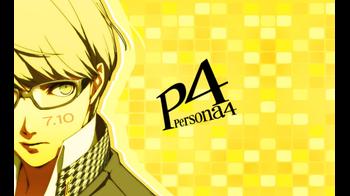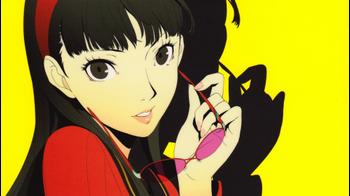
High School, Shadows, and Truth: Persona 4 and me
Persona 4 is arguably the most celebrated JRPG release in recent years. Often placed on a pedestal alongside seminal titles like Chrono Trigger and Final Fantasy VII, but for reasons far different than the mechanical refinement of the genre those games brought about. Persona 4 is through and through a personal affair, and nowhere is this more evident than in the testimonials of the people who play it. Every player’s declaration can’t be summed up in a single piece, but at the very least I can tell you how this game left an indelible impression on me. High school is supposed to be the best years of your life, and in this game’s case I would be inclined to agree. Persona 4 let me live an idealized high school fantasy, had me pondering Jungian psychology, and served as a reminder that you can hold yourself back more so than anything else.
Note: If you have not played Persona 4, the following will spoil big plot points so proceed at your own discretion!
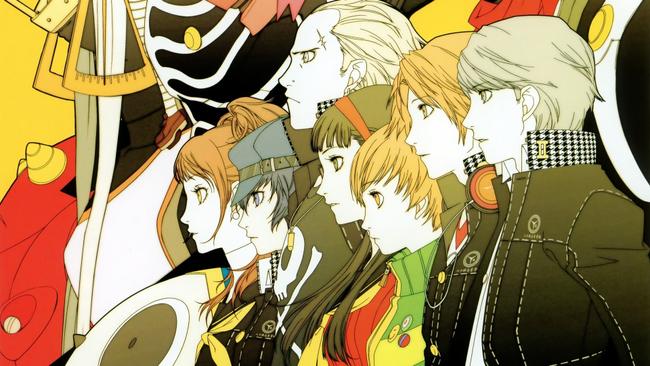
Despite Persona 4’s heavy use of the supernatural and occult iconography, perhaps the most incongruous part of the game to me was the idealized depiction of high school. Obviously setting aside things like the serial murderers and apocalyptic events, I just found day to day life in small town Inaba to be much more pleasant than my own years in high school. It was the John Hughes coming-of-age story taken form in a videogame; a group of teenagers from different walks of life come to aid of each other and those in need, uncompromising in their empathy and love they have for one another. I couldn’t help but find myself envious of the bond this group of would be heroes had formed, even if extreme circumstances brought them together to forge those bonds. Sometimes I’d see the investigation team and be reminded of social cliques in high school, the kind you could never be apart of because you were not cool enough. This being interactive fiction however, not only were you promised a seat at the cool kid’s lunchroom table this time around, you were at the head of that table.
You explore the world of Inaba through the eyes of Yu Narukami who is, like the player, the new guy in town. Yu is largely a self insert character, with a tinge of his own personality laced about dialog options present in the game. In all of the Persona 4 expanded fiction and anime adaptations, Yu exudes nothing but confidence and is bustling with positive traits. He’s able to deal with every undesirable situation thrown his way in a moments notice. More importantly, he’s very charming and not awkward in the least bit, the antithesis of your average teenager. Initially I used to think the various expanded Persona 4 fiction's depiction of Yu was a bad caricature of your in game avatar. The more I’ve thought on it though, the more in line that depiction is with his in game counterpart than it isn't. In Persona 4 you are always given the option to say or do the right thing in any given situation, which is for the vast overwhelming majority of people the polar opposite of high school years. Yu is the person most people wished they were during adolescence.
If I were to liken my own high school experience with that of Persona 4’s, I would be one of the background NPCs that spits out a single line of dialog and you never give them a second thought. A nihilistic loser that hated most everyone around myself at the time that chose to be miserable for no other reason than I thought the world owed me everything. When other kids were out having fun on a Friday night, I was at home in my room pondering over the thought of taking all ‘easy’ courses so I could play more World Of Warcraft. It was in that bubble that I chose to let my emotions reside; furious I didn’t have athletic ability, academic success, very few friends to rely on, a girlfriend, the list goes on. Like a lot of young men though, the world most certainly did not owe me anything, and all those things I was mad that I didn’t have never came to me because I rarely tried. Hardly ever did I try in high school, and therein was my downfall. Basically, I was the anti-Yu Narukami.
So despite Persona 4’s high school experience being idealized to the point where it feels distant from reality, I welcomed that fantasy. It was like retreading old ground, but this time I knew better, this time I wouldn’t be miserable and think everyone owed me something. So I lived vicariously through Yu. Instead of favoring Warcraft over academics, Yu would actually take the time to study. Yu would actually hone athletic ability by taking part in sports as opposed to cursing fellow students from the bleachers. Yu would have a close group of friends cause he actually cared about their well being, and didn’t indulge on their own misfortune. Yu would go on dates and actually have a girlfriend, and if it didn’t work out his mind wouldn’t be laced with misogynistic nonsense. Again, he would be the antithesis to high school Kyle.
Unlike say Dragon Age, you’re not really given the option to be outright ‘evil’ in Persona 4. This was probably intentional on the part of the developers, again playing into the idealized depiction of high school. Normally in a RPG not giving the player a choice would be seen as a bad thing, but being evil in this game would hurt the illusion. I played the game like it was a second chance - a chance undo some aspects of my past self that were less than desirable. If Rise needed someone to talk to about her idol career, I would listen. When Teddie needed lessons on how to act more human, I would teach him. If Yosuke needed to eat a good left hook to the face, I’d crack my knuckles and obliged his wishes (because you know, love).
Therein lies why I think the ending of Persona 4 hits people as hard as it does. As Yu leaves Inaba, the player leaves the fantasy. The avatar and his life you crafted are just hopes of ‘what could have been’. In my case, playing this game was a second chance at adolescence. The only trouble is, for as emotionally resonant as the game was and the ending in particular; there’s no going back. The choices I made in high school will be with me forever. When it was all said and done, I couldn’t help but say to myself “why didn’t this game come out when I was 12?!” in the hopes that it could have set me down a better path early on in life. That’s the thing though, Persona 4 was created people whose teenage years were far behind them too. We learn through experience, and rarely are we to get anything in life right on the first go around.
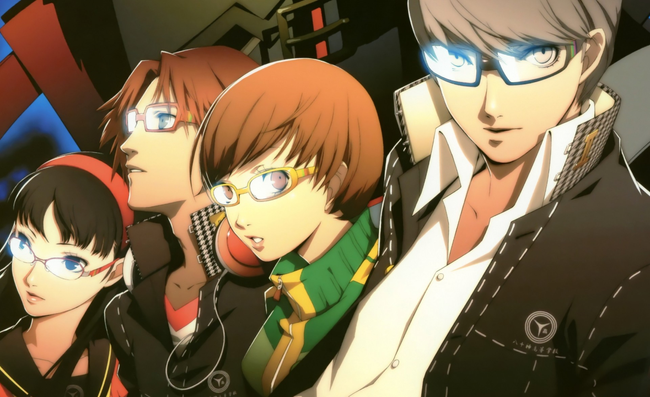
The overarching theme of Persona 4 is ‘truth’, and seeing it through all the obstacles thrown at the characters. Be it discovering the antagonist’s identity, what the source of the fog is, and the main cast facing their inner demons; truth is always the objective. The latter point focusing heavily on Persona 4’s use of psychology. Throughout the game, the cast has to confront their ‘Shadow selves’--a dark reflection of the parts of their own personality they’ve denied themselves. ‘Shadows’ in this sense were of course not something that originated from the Persona series, rather the concept came from the works from famed Swiss psychiatrist Carl Jung. Jungian psychology states that a shadow is made up of an unconscious conglomerate of the undesirable aspects of a person’s personality. The idea being, whatever truths about yourself you deny become part of that unconscious whole that is a shadow. It should be noted though, that a shadow is not necessarily evil. The developers of Persona 4 seemed to agree with the aforementioned statement.
Chie in particular deals with what I think is one of the more revealing shadows in the game, mostly in how it’s an uncomfortable reality for a lot of people and their friendships. During the investigation team’s attempt to rescue Yukiko, the group hear Yukiko’s innermost thoughts that she takes solace in the fact that Chie is always there to comfort and protect her. This prompts Chie’s shadow to appear, where the shadow reveals that Chie is secretly envious of Yukiko for her beauty. That deep down, Chie relishes that the person she’s jealous of is reliant on her. It’s the idea the no matter how much you love or care about your friends, part of you might use them to prop yourself up at their expense.
A more fantastical theory in Jungian psychology is that if a person can learn to accept all facets of their unconscious mind, they would elevate themselves to the next level in human evolution. Persona 4 runs with this idea, as accepting one's shadow and thus what the character’s dislike about themselves leads to them gaining the power of a Persona. In Chie’s case, she realizes that despite that her relationship with Yukiko may be complicated, she must accept her shadow. She will never be able to evolve as a person, save Yukiko from a doomed fate, and ultimately gain her persona without doing so. The underlying idea being we all have a ‘dark side’, and denying powerful emotions can potentially lead to dangerous outbursts. Which brings back my thoughts on my own high school experience. In truth, despite how much I may have disliked who I was back then and how I wish I could’ve re-written it, the notion goes against the core message of the game. Those less-than-desirable aspects of ourselves are always present, what’s important is to be introspective and learn from past mistakes and misconceptions, rather than keep picking at scabs of what could have been.
In all this talk of identity, it would be remiss not to mention how easy it is to relate to the cast in Persona 4. If you can believe it, the character I saw eye to eye with the most was actually Yukiko Amagi. During the section of the game that deals with Yukiko’s disappearance, her shadow states that she’s hoping for a ‘prince charming’ to come along and rescue her. Though you discover quickly that she’s not literally looking for a love interest, but rather something that can take her away from her from a pre-determined fate without her consent. The Amagi family expects her to inherit their Inn and stay in Inaba well beyond her high school years. Her shadow says outright “I have no hope if I stay, and no courage to leave...So I sit on my ass hoping that someday my Prince will come!” Part of Yukiko is stifled, trapped, and resentful of her life in small town Inaba. Worst of it all, she struggles to overcome her own introversion.
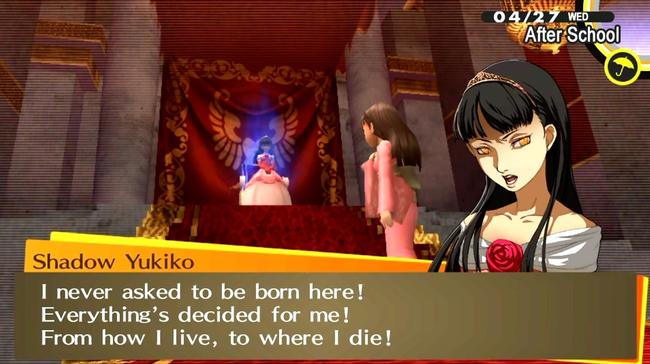
Having grown up in a small town in northern Canada, I already recognized enough of Yukiko’s plight in my own life. Humans are social creatures, we learn most through new experiences and meeting new people. Two things that quite frankly are hindered greatly while living in an isolated small town. At least part of the reason I was so miserable when as a teenager was due to living in a place that stood still, nothing ever interesting happened and that humdrum life could be quite smothering. What really made me identify with Yukiko though, was when her shadow suggested that she wants things to change but is too afraid to put in the effort for said change. She’s an introvert, someone that can’t make lifestyle changes easily while simultaneously thinking her life is not in her own hands. From my own life experience, I can confirm that a mindset like that can lead to an infinite feedback loop. Thinking there is no way to change life is the only real trap I ever found myself in.
If you end up doing Yukiko’s social link, it’s revealed that she decides to stay in Inaba and eventually run the Amagi Inn. While that may not be the ideal ending to her character arc, she came to an important realization: she does have a choice in how her life plays out. Yet again I found myself envious of Persona 4, wishing I had realized during my adolescence that the only thing keeping me in the small town I lived in was my own hesitance for change. Despite that however, Yukiko’s character arc ends with a positive message. The reminder that if you feel stuck in life, there’s a good chance you’re the only one holding yourself back.
If truth is the core theme of Persona 4, then being true to yourself is probably what the developers were alluding to the most. The first time I played this game it was somewhat of a painful experience, a constant reminder of how awful of a person I was in high school and no amount of indulging in the fantasy would change that. However it also taught me that denying aspects of yourself that you dislike does not end up doing any good either. It encourages self examination, and more importantly the change that comes from it. So I opt to feel those changes stretching up and over me, because life goes on with or without you.
